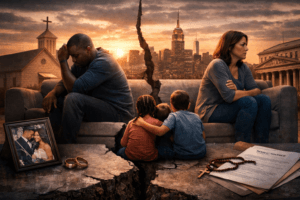EDUPEACE | The paradox of our time
But if we consider the original list of Gandhi’s blunders, we appreciate the necessity of finding our global compass and redirecting our lives to the path of rectitude…


Though he was known to many as a stand-up comedian, George Carlin (1937 -2008) was also a philosopher whose words, forget his lifestyle, aptly capture the reality of our today’s world. He might have had the American society primarily in mind when he said his inspiring words that aptly capture the ironies and contradictions of modern life, the issues he raised are of potent relevance to us all for our education and peace.
As we are engaged in the rat race of running after money and other vain embellishments of this fleeting life, resulting in crass corruption and insecurity that typify the nation, at the expense of what really matters, it is good we pause and reflect on the call of Carlin. The call is nothing more than a reflection of what we have become: people without souls.

This is especially important as we keep bumbling from blunder to blunder and as our quest for success drives us further and farther from the soul. We have leaders who are dealers (in corruption) and teachers who cheat their students as well as thieves that are decorated chiefs. The outcome is the sorry state of the world where we live in, the microcosm of which is virtually every country. What is the paradox of our time in history? Mr. Carlin provided the answer and I take liberty to quote him at length:
“The paradox of our time in history is that we have taller buildings but shorter tempers, wider freeways, but narrower viewpoints. We spend more, but have less, we buy more, but enjoy less. We have bigger houses but smaller families, more conveniences, but less time. We have more degrees but less sense, more knowledge but less judgement, more experts but more problems, more medicine, but less wellness.
“We drink too much, smoke too much, spend too recklessly, laugh too little, drive too fast, get too angry, stay up too late, get up too tired, read too little, watch TV too much, and pray too seldom.
“We have multiplied our possessions, but reduced our values. We talk too much, love too seldom, and hate too often.
“We’ve learned how to make a living, but not a life. We’ve added years to life but not life to years. We’ve been all the way to the moon and back, but have trouble crossing the street to meet a new neighbour. We conquered the outer space but not inner space. We’ve done larger things, but not better things.
“We’ve cleaned up the air but polluted the soul. We’ve conquered the atom, but not our prejudice. We write more, but learn less. We plan more, but accomplish less. We’ve learned to rush, but not to wait. We build more computers to hold more information, to produce more copies than ever but we communicate less and less.
“These are times of fast foods and slow digestion, big men and small character, steep profits and shallow relationships. These are the days for two incomes and more divorce, fancier houses but broken homes. These are days of quick trips, disposable diapers, throwaway morality, one night stands, overweight bodies, and pills do everything from cheer, to queit, to kill. It is a time when there is much in the showroom and nothing in the stockroom. A time when technology can bring this letter to you, and a time when you can choose either to share this insight, or to hit delete…
“Remember to hold hands and cherish the moment because for someday that person will not be there again.
“Give time to love, give time to speak! And give time to share the precious thoughts in your mind. And always remember: Life is not measured by the number of breaths we take, but by the moments that take our breath away.”
The path to recovery begins from us being wired accordingly as we strive to address the paradoxes that ruin our lives.
BREAKING THE BONES OF OUR BLUNDERS
A few weeks before he was assassinated in 1947, the “father of modern India” and esteemed advocate of non-violent opposition and resistance, Mahatma Gandhi, had a conversation with his grandson in which he provided him the “seven blunders” that accounted for the violence that ravaged the world.
These seven blunders, which he had earlier called “seven social sins” in an article he published in his weekly newspaper, “Young India,” of October 22 1925, are: wealth without work, pleasure without conscience, knowledge without character, commerce without morality, science without humanity, worship without sacrifice and politics without principles. His grandson, Arun Gandhi, added the eighth later, which he called “rights without responsibilities”. As a fan, I also added democracy without decorum, courts without justice and religion without righteousness to the list to make it eleven.
But if we consider the original list of Gandhi’s blunders, we appreciate the necessity of finding our global compass and redirecting our lives to the path of rectitude. The truth is that there is too much obsession with wealth these days without interest in work. This attitude makes people, especially the youth, engage in cybercrime and fraud. All what matter is to live large, leading to Huspuppism, named after a flamboyant African socialite arrested in Dubai by FBI and Interpol on the allegations of committing over USD 35 million fraud.
We live in the age of mindless pleasure without conscience where rape is committed daily as if the perpetrators would love the experience for their mothers, sisters and daughters. The corrupt-souled individuals steal collective resources of their homelands and abandon the masses, their own people, to the ravages of abject poverty, against conscience. Then, people acquire more degrees and attend more schools but their character is toxic. The essence of learning, ultimately, is the reformation of character and society. However, it is a blunder that those who appear to be educated sometimes happen to be the worst criminals as their actions and inactions destroy life and livelihoods.
Quite unfortunate, people care about profit and forget morality. They kill and main to take advantage of others. Examples are legion of those who live on ‘blood money’ and resources accumulated on account of bloodshed and treachery. Besides, there is so much emphasis on science at the expense of humanity. Weapons of mass destruction and scientific inventions are made to mar, not just to make; to destroy, not just to build.
While worship has been reduced to mere entertainment without the commensurate sacrifice on the part of worshippers to make it, politics without principle reigns supreme as populist and authoritarian rulers hold the world at the jugular, oppressing, repressing and suppressing their followers.
The way out of the blunders is for all to return “without” to “with” and always ensuring that we seek honest wealth with work, have pleasure with conscience, acquire knowledge with character, pursue commerce with morality, do science with humanity, observe worship with sacrifice and sincerity while we play politics with principles at all times.














